Free E-Mail
Bible Studies
Beginning the Journey (for new Christians). en Español
Old Testament
Abraham
Jacob
Moses
Joshua
Gideon
David, Life of
Elijah
Psalms
Solomon
Songs of Ascent (Ps 120-135)
Isaiah
Advent/Messianic Scriptures
Daniel
Rebuild & Renew: Post-Exilic Books
Gospels
Christmas Incarnation
(Mt, Lk)
Sermon on the Mount
(Mt 5-7)
Mark
Luke's
Gospel
John's Gospel
7 Last Words of Christ
Parables
Jesus and the Kingdom
Resurrection
Apostle Peter
Acts
The Early Church
(Acts 1-12)
Apostle Paul
(Acts 12-28)
Paul's Epistles
Christ Powered Life (Rom 5-8)
1 Corinthians
2 Corinthians
Galatians
Ephesians
Vision for Church
(Eph)
Philippians
Colossians,
Philemon
1
& 2 Thessalonians
1 & 2 Timothy,
Titus
General Epistles
Hebrews
James
1 Peter
2 Peter, Jude
1, 2, and 3 John
Revelation
Revelation
Conquering Lamb of Revelation
Topical
Glorious Kingdom, The
Grace
Great Prayers
Holy Spirit, Disciple's Guide
Humility
Lamb of God
Listening for God's Voice
Lord's Supper
Names of God
Names of Jesus
Christian Art
About Us
Podcasts
Contact Us
Dr. Wilson's Books
Donations
Watercolors
Sitemap
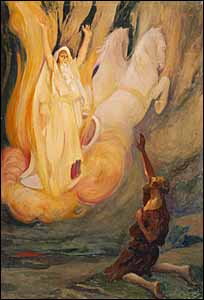 James J. Tissot, 'Elijah Ascends in a Chariot of Fire' (1896-1902), gouache on board, The Jewish Museum, New York. |
Unless we die suddenly, there comes a time for every servant of God to close out a ministry. Often, it doesn't seem to be finished. For Elijah, two of the three tasks he has been directed to do remain undone, to be completed by Elisha when the time is right. Sometimes men and women of God resist this change with every fiber of their being. Other times, they welcome it as a blessed rest from stress and hard labor. They're worn. They're tired.
It's hard. It's time to go. Elijah knows it. So does Elisha his successor. But that doesn't make it any easier for Elijah. There is a pronounced ambivalence in his actions as he nears the end. In this lesson we'll examine Elijah's last days and his legacy in the New Testament, and for all of us.
7.1 Elijah's Entrance into Heaven (2 Kings 2:1-18)
Elijah's and Elisha's Journey (2 Kings 2:1)
"When the Lord was about to take221 Elijah up to heaven in a whirlwind,222 Elijah and Elisha were on their way from Gilgal." (2 Kings 2:1)
We meet Elijah and Elisha on a journey from Gilgal, a city on the site where the people of Israel first encamped when they crossed the Jordan into the Promised Land, "on the eastern border of Jericho" (Joshua 4:19), "on the plains of Jericho" (Joshua 5:10).223 Here they erected the first altar to celebrate the fulfillment of Yahweh's promise. For a while, it was a spiritual center and place of sacrifice where Samuel judged.224 Later, Gilgal lapsed into apostasy,225 which may have been the reason for Elijah's visit there at this time.
Stay Here! (2 Kings 2:2-6)
One of the strange things about this passage is Elijah's three-fold command, "Stay here!"226 It's as if Elijah wants to be alone in these final days. Or it may be a test of how determined Elisha will be to remain Elijah's faithful disciple.
Something interesting about Elijah's command is that it is polite -- at least in some English translations.
"Please stay here" (ESV)
"Stay here, please" (NASB)
"Tarry here, I pray thee" (KJV)
These are attempts to translate a Hebrew word that seems to soften the command,227 though the NIV and NRSV omit it altogether.
At any rate, Elisha doesn't feel compelled to obey Elijah in this. Instead, he replies with an oath in the name of Yahweh.
"As surely228 as the Lord lives and as you live, I will not leave229 you." (2 Kings 2:2b, 4b, 6b)
Elisha adamantly refuses, and Elijah doesn't insist, though he repeats his command in two other locations. Elisha won't budge.
This reminds me of Naomi's entreaty to Ruth to stay with her people in Moab. Ruth, too, refuses with an oath:
"Don't urge me to leave you or to turn back from you. Where you go I will go, and where you stay I will stay. Your people will be my people and your God my God. Where you die I will die, and there I will be buried. May the Lord deal with me, be it ever so severely, if anything but death separates you and me." (Ruth 1:16--17)
Just as Ruth sensed that her destiny was tied up with Naomi in Bethlehem, so Elisha realizes that God has called him to remain with Elijah no matter what. Nothing will shake him.
Our following of Jesus needs to be just as determined! Some said they would follow, but put off taking the final step (Luke 9:57--62). Others were invited, but the cost of following was too much for them (Mark 10:17-27). After the feeding of the 5,000, when Jesus taught his followers that they must eat his body and drink his blood, many left in disgust. This was too much! The Twelve didn't really understand the saying, but they knew Jesus and trusted him.
"From this time many of his disciples turned back and no longer followed him.
'You do not want to leave too, do you?' Jesus asked the Twelve.
Simon Peter answered him, 'Lord, to whom shall we go? You have the words of eternal life. We believe and know that you are the Holy One of God.'" (John 6:66--69)
There are times when Jesus' road seems very hard. Lesser people give up. But Jesus calls you and me to continue, even when we don't understand where he is leading. He calls us to the same determination that Elisha had:
"As surely as the Lord lives and as you live, I will not leave you." (2 Kings 2:2b, 4b, 6b)
Q27. (2 Kings 2:2-6) Why do you think Elijah discourages
Elisha from following him at the end? What is Elisha's response? What kinds of
discouragements have you faced that made you wonder if you should keep on
following the Lord?
https://www.joyfulheart.com/forums/topic/2131-q27-discouragements/
The Prophets at Bethel (2 Kings 2:2-3)
"2 Elijah said to Elisha, 'Stay here; the Lord has sent me to Bethel.'
But Elisha said, 'As surely as the Lord lives and as you live, I will not leave you.' So they went down230 to Bethel." (2 Kings 2:2)
Notice that Elijah is being directed by the Lord. Listening for the voice of the Lord and being obedient is the key to effective ministry! (For more on this, see my study, "Listening for God's Voice." www.jesuswalk.com/voice/)
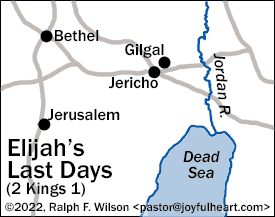 The Last Days of Elijah (larger map) |
Gilgal, where they had been, lies in the Jordan Valley, 845 feet (258 meters) below sea level. From there, Elijah and Elisha are climbing up into the hills on their way to Bethel (elevation 2,825 ft, 861 meters above sea level), an ancient Canaanite city situated in the mountain chain that forms the backbone of the Promised Land, about 12 miles (19 km.) north of Jerusalem.231 It was at Bethel that Jacob had a vision of a ladder going up to heaven and God spoke to him.232 In the early days of Israel, Bethel had been a spiritual center, another city on Samuel's circuit as Israel's judge.233
But when the kingdom split into northern and southern kingdoms, Jeroboam placed a golden calf in Bethel to make it a major place of worship, so Bethel had become a religious center identified with idolatry.
"The company of the prophets at Bethel came out to Elisha and asked, 'Do you know that the Lord is going to take your master from you today?'234
'Yes, I know,' Elisha replied, 'but do not speak of it.'" (2 Kings 2:3)
This company of prophets at Bethel is made up of spiritual men, faithful to Yahweh. They are listening for his voice. Prophecy, of course, is speaking what one hears from God. They say to Elisha that Yahweh is going to "take away"235 Elijah from him this very day.
The ESV and KJV bring out an additional element: "The Lord will take away your master from over you" (ESV), literally, "from thy head" (KJV).236 Not only will Elijah be taken away, he will no longer be Elisha's superior or "head"; Elisha will be his own man under God.
Elisha, too, is listening to God. He acknowledges what the prophets say is true, but tells them not to talk openly about it.237 Why? Perhaps it is not the time. Perhaps out of deference for Elijah. We don't know. I do know that some things the Lord shows us are secrets, not to be shared with others -- like Jesus' caution to his disciples not to tell about his Transfiguration until later (Matthew 17:9). We need to respect the confidence of the Lord.
The Prophets at Jericho (2 Kings 2:4-5)
"4 Then Elijah said to him, 'Stay here, Elisha; the Lord has sent me to Jericho.'
And he replied, "As surely as the Lord lives and as you live, I will not leave you." So they went to Jericho.
5 The company of the prophets at Jericho went up to Elisha and asked him, 'Do you know that the Lord is going to take your master from you today?'
'Yes, I know,' he replied, 'but do not speak of it.'" (2 Kings 2:4-5)
The prophets at Jericho have been listening to the Lord and know what will take place, but Elisha hushes them also. Now the Lord shows Elijah he must go to the nearby Jordan River.
"Then Elijah said to him, 'Stay here; the Lord has sent me to the Jordan.'
And he replied, 'As surely as the Lord lives and as you live, I will not leave you.' So the two of them walked on." (2 Kings 2:6)
Elijah tries to dissuade Elisha once again, but Elisha ignores him.
Elijah Parts the Jordan River (2 Kings 2:7-8)
The prophets from Jericho follow them to the Jordan to see what will happen.
"7 Fifty men of the company of the prophets went and stood at a distance, facing the place where Elijah and Elisha had stopped at the Jordan. 8 Elijah took his cloak,238 rolled it up and struck the water with it. The water divided to the right and to the left, and the two of them crossed over on dry ground." (2 Kings 2:7-8)
Elijah folds up his cloak and strikes239 the surface of the Jordan with it, using the rolled-up cloak240 much like Moses used his rod. There are clear echoes here of the Lord parting the Red Sea under Moses (Exodus 14:21-31) and parting the Jordan River at the Conquest under Joshua (Joshua 3:13-17). The phrase "crossed over on dry ground" found in the earlier accounts also emphasizes the magnitude of the miracle.241 Elijah is clearly being depicted as a successor to Moses!
A Double Portion of Elijah's Spirit (2 Kings 2:9-11)
Elijah finally realizes that Elisha is going to be faithful. He is not going anywhere. He addresses him more kindly this time.
"When they had crossed, Elijah said to Elisha, 'Tell me, what can I do242 for you before I am taken from243 you?'" (2 Kings 2:9a)
Elisha doesn't hesitate.
"'Let me inherit244 a double portion of your spirit,' Elisha replied." (2 Kings 2:9b)
Some have suggested that Elisha is greedy, wanting twice the power of his master. But no, he is asking for the portion that the first-born son was entitled to under the Jewish laws of inheritance -- twice whatever the other sons received.245
"He must acknowledge the son ... as the firstborn by giving him a double share of all he has." (Deuteronomy 21:17a)
Elisha wants to be considered the first-born, that is, the true successor to the departing prophet.246
Elijah seems to hesitate.
"'You have asked a difficult thing,'247 Elijah said, 'yet if you see248 me when I am taken from you, it will be yours -- otherwise not.'" (2 Kings 2:10)
This reminds me of James and John asking to sit at Jesus' right and left in the Kingdom. Jesus responded much like Elijah:
"To sit at my right or left is not for me to grant. These places belong to those for whom they have been prepared." (Mark 10:40)
Perhaps Elisha's determination to stick close to Elijah has a strong spiritual element. Jones interprets Elijah's words, "If you see me when I am taken from you," in a spiritual sense, that is, seeing, discerning spiritually.249
Q28. (2 Kings 2:9-11) Why does Elisha ask for a double
portion (or full first-born's inheritance) of Elijah's spirit? Is he greedy for
power? Is it right to long for a greater presence and power of the Holy Spirit?
How should we seek this?
https://www.joyfulheart.com/forums/topic/2132-q28-double-portion/
The Whirlwind, Chariots, and Horsemen (2 Kings 2:11-12)
"11 As they were walking along and talking together, suddenly a chariot of fire and horses of fire250 appeared and separated251 the two of them, and Elijah went up252 to heaven in a whirlwind. 12 Elisha saw this and cried out, 'My father! My father! The chariots and horsemen253 of Israel!'254 And Elisha saw him no more." (2 Kings 2:11-12a)
There are many artistic depictions of Elijah riding a chariot up into heaven. But that isn't what the text tells us. It says:
"Elijah went up to heaven in a whirlwind." (2 Kings 2:11b)
The windstorm255 that catches up Elijah could well have been a whirling wind, such as the tornados or cyclones (medicanes) that occur often in the Mediterranean, especially from September through January, in the west and central Mediterranean.256 This one, of course, is sudden and miraculous. One minute they are walking side-by-side talking. Then, suddenly,257 a fiery chariot258 and horsemen (or horses) separate them, and the next thing Elisha can see, Elijah is caught up.
Chariot of Fire
The war chariot, a rolling archery platform pulled by formidable horses, was the ultimate weapon of its time, especially effective in flat areas where it could race across a plain and decimate soldiers on foot. War chariots would typically have a driver/shield-bearer and the fighting man. Wisemen observes,
"The chariots and horsemen symbolized strong protection as well as the forces of God's spiritual presence, which were the true safety of Israel."259
In the Psalms we read:
"The chariots of God are tens of thousands
and thousands of thousands;
the Lord has come from Sinai into his sanctuary." (Psalm 68:17)
Later, when Elisha and his servant are in a walled city surrounded by the Syrian army and its horses and chariots, Elisha's servant is terrified. Elisha famously responds:
" 'Don't be afraid.... Those who are with us are more than those who are with them.' And Elisha prayed, 'O Lord, open his eyes so he may see.' Then the Lord opened the servant's eyes, and he looked and saw the hills full of horses and chariots of fire all around Elisha." (2 Kings 6:16-17)
Yahweh is sometimes titled, Yahweh of Hosts, the Lord of Hosts, where "hosts" means armies -- the armies of heaven. At the end of the age, Jesus heads this mighty army that brings Yahweh's righteous judgment on those who oppose him.
"I saw heaven standing open and there before me was a white horse, whose rider is called Faithful and True. With justice he judges and makes war.... The armies of heaven were following him, riding on white horses and dressed in fine linen, white and clean." (Revelation 19:11, 14)
Sometimes, we face impossible situations, but when we look to Jesus, we see that his power exceeds any other power by many orders of magnitude. He is Lord!
So, the fiery chariot and horsemen escort Elijah up into God's presence in heaven. The only other person who goes to heaven without seeing death is Enoch:
"Enoch walked with God; then he was no more, because God took him away."260 (Genesis 5:24)
Even Elisha dies after a final illness (2 Kings 13:14). But if you are alive at Christ's coming, you'll experience that rare privilege like Enoch and Elijah, and be caught up to meet Jesus in the air (1 Thessalonians 4:13-18).
Elijah goes to glory in glorious, spectacular fashion. Nevertheless, Elisha mourns him.
"Then he took hold of his own clothes and tore them apart."261 (2 Kings 2:12b)
Elisha rending his garments is a sign of his deep sorrow and mourning at the passing of his mentor Elijah, one of Israel's greatest prophets.
Elijah's Mantle (2 Kings 2:13-15)
But Elisha doesn't spend too much time in mourning.
"13 He picked up the cloak that had fallen262 from Elijah and went back and stood on the bank of the Jordan. 14 Then he took the cloak that had fallen from him and struck the water with it. 'Where now is the Lord, the God of Elijah?' he asked. When he struck the water, it divided to the right and to the left, and he crossed over. 15 The company of the prophets from Jericho, who were watching, said, 'The spirit of Elijah is resting263 on Elisha.' And they went to meet him and bowed to the ground before him." (2 Kings 2:13-15)
Elisha now moves to take up the mantle and ministry of his mentor Elijah, and the company of prophets standing by confirm this and acknowledge his authority over them. The chapter concludes with the prophets searching in vain to find Elijah (2 Kings 2:16-18). He is not there, but has been caught up to be with the Father.
Oh, how we long for the mantle of the Holy Spirit's anointing and commissioning to rest upon us! It is a fearful thing. A heavy responsibility. But this mantle is the privilege of a lifetime that Elisha now wears as Elijah's successor.
7.2 Fulfilling Elijah's Instructions and Prophecies
As mentioned above, Yahweh assigns Elijah three tasks on Mount Horeb (1 Kings 19:15-16)
- Anoint Hazael king over Syria (Aram).
- Anoint Jehu king over Israel.
- Anoint Elisha to succeed him as prophet.
Only one of these Elijah accomplishes himself. The other two become the task of his successor, Elisha.
Thus, when Elijah is taken up into heaven there are several prophecies yet unfulfilled. In brief scope, I'll connect the prophecies with their fulfillment, so you won't be left hanging. Elisha himself has a remarkable ministry of his own, but since this study is focusing on Elijah, I'll only mention Elisha's exploits that specifically complete Elijah's assignments and prophecies from the Lord.
Anointing Hazael King over Syria (2 Kings 8:7-15)
At Mount Horeb Yahweh had instructed Elijah:
"Go back the way you came, and go to the Desert of Damascus. When you get there, anoint Hazael king over Aram." (1 Kings 19:15)
The task now falls to Elisha. Damascus is the capital of the Kingdom of Aram or Syria. Elijah is commissioned to anoint a man who will become king of a foreign country -- moreover, a country that is Israel's enemy. Strange instruction from the Lord! Now Elisha carries it out.
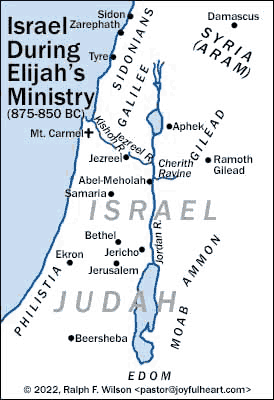 Elisha travels to Damascus, capital of Syria to anoint Hazael as king instead of Ben-Hadad II. Larger map. |
Elisha travels to Damascus, capital of Syria. Ben-Hadad II is ill. The king sends Hazael, a highly placed court official, to inquire of "the man of God" whether or not he will recover. Hazael approaches Elisha with a huge gift -- 40 camel-loads of wares from Damascus.
Elisha says to Hazael, "Tell him that he will recover," though Elisha reveals to Hazael that Ben-Hadad will die instead. Then Elisha begins to weep. Hazael asks why.
"'Because I know the harm you will do to the Israelites,' [Elisha] answered. 'You will set fire to their fortified places, kill their young men with the sword, dash their little children to the ground, and rip open their pregnant women.'" (2 Kings 8:12)
Hazael protests to Elisha that he would never commit such atrocities. But Hazael does indeed ravage God's people in future assaults against the kingdom of Israel as punishment for her sins.264 Later, Hazael even attacks Jerusalem, capital of the southern kingdom.265
Elisha reveals to Hazael that he, Hazael, will succeed Ben-Hadad as king of Syria. Hazael reports back to Ben-Hadad, but the next day he smothers the sick man on his bed and seizes the throne for himself.266
"The next day he took a thick cloth, soaked it in water and spread it over the king's face, so that he died. Then Hazael succeeded him as king." (2 Kings 8:15)
Ahab refused to execute Ben-Hadad when he had the chance (1 Kings 20:30-34, Lesson 4.2). Now God accomplishes Ben-Hadad's execution by the hand of Hazael, who assassinates him.
Anointing Jehu King over Israel
Elijah is given a second commission on Mount Horeb, to anoint the next king of the southern kingdom.
"Anoint Jehu son of Nimshi king over Israel." (1 Kings 19:16a)
Again, it isn't Elijah who personally fulfills this direction, but Elisha.
In the southern kingdom of Judah, there was a single, unbroken dynasty of Davidic kings for nearly five hundred years -- from the time of David until the exile. In the break-off northern kingdom of Israel, however, there were a multitude of dynasties. Some would last a few days or years. Others might last a century. For example, Ahab's father had assassinated the previous king to become king himself.
King Ahab of Israel is succeeded by his evil son Ahaziah (853-852 BC).267 Since he had no sons, he is succeeded by his brother Jerhoram (or Joram), another evil king (852-841 BC). Jehu promptly assassinates Jehoram, the last king in this evil dynasty, slain in fulfillment of Yahweh's word against the house of Ahab.268
Here is how it came about.
Elisha Directs that Jehu Be Anointed King over Israel (2 Kings 9:1-10)
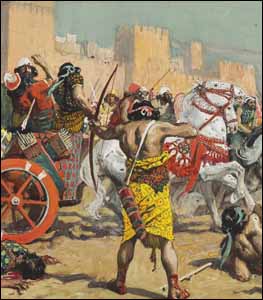 James J. Tissot, detail of 'Jehoram Pierced by an Arrow' (1896-1904), gouache on board. Jewish Museum. Larger image. Shows assassination by Jehu (2 Kings 9:24). |
Elisha assigns one of the company of prophets to find Jehu, an officer in Israel's army, and secretly anoint him.
"Take the flask and pour the oil on his head and declare, 'This is what the Lord says: I anoint you king over Israel.' Then open the door and run; don't delay!" (2 Kings 9:3)
The young prophet obeys. Jehu is engaged in battle with Syrian forces at Ramoth-Gilead. The young prophet finds him in the city, pours oil on Jehu's head, and declares in Yahweh's name:
"6b I anoint you king over the Lord's people Israel. 7 You are to destroy the house of Ahab your master, and I will avenge the blood of my servants the prophets and the blood of all the Lord's servants shed by Jezebel. 8 The whole house of Ahab will perish. I will cut off from Ahab every last male in Israel -- slave or free. 9 I will make the house of Ahab like the house of Jeroboam son of Nebat and like the house of Baasha son of Ahijah. 10 As for Jezebel, dogs will devour her on the plot of ground at Jezreel, and no one will bury her."' Then he opened the door and ran." (2 Kings 9:6b--10)
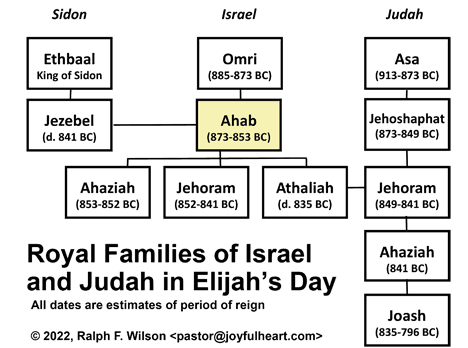 Royal Families of Israel and Judah in Elijah's Day (larger chart) |
A trumpet is blown and Jehu is declared king by those around him. Then, before word can spread, Jehu mounts his chariot and leads his troops toward Jezreel, where the current king of Israel, Jehoram, son of Ahab, has been wounded in battle and is recovering in the palace in Jezreel.
Jehu Kills Jehoram (2 Kings 9:14-29)
The lookout on the tower in n Jezreel sees Jehu in his chariot and his troops approaching the city. The lookout reports to the king
"The driving is like that of Jehu son of Nimshi--he drives like a madman." (2 Kings 9:20)
Sensing that something is wrong, Jehoram rides out to him. They meet at the vineyard that Ahab had seized from Naboth years before. Jehu replies to Jehoram,
"How can there be peace as long as all the idolatry and witchcraft of your mother Jezebel abound?" (2 Kings 9:22)
As Jehoram flees, Jehu draws his bow and shoots him between the shoulders, piercing his heart. His body is thrown onto the land of Naboth in a second fulfillment of Elijah's prophecy to Ahab:
"In the place where dogs licked up Naboth's blood, dogs will lick up your blood." (1 Kings 21:19b)
Jezebel Dies in Fulfillment of Prophecy (2 Kings 9:30-37)
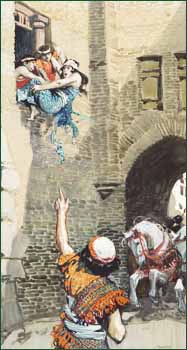 James J. Tissot, 'The Death of Jezebel' (1896-1902), gouache on board, Jewish Museum, New York. Larger image. |
Jezebel is next. Jehu calls to some eunuchs in Jezebel's second floor chamber to throw her down.
"So they threw her down, and some of her blood spattered the wall and the horses as they trampled her underfoot." (2 Kings 9:33b)
By the time it came for her to be buried, there wasn't much left. The scavenger dogs had eaten her according to Elijah's prophecy:
"On the plot of ground at Jezreel dogs will devour Jezebel's flesh" (2 Kings 9:36b; cf. 1 Kings 21:23).
Jehu Wipes Out Ahab's Descendants (2 Kings 10:17)
Elijah's prophecies against Ahab and his house are nearly complete. However, one was left:
" 21 'I am going to bring disaster on you. I will consume your descendants and cut off from Ahab every last male in Israel--slave or free. 22 I will make your house like that of Jeroboam son of Nebat and that of Baasha son of Ahijah, because you have provoked me to anger and have caused Israel to sin." (1 Kings 21:21--22)
This too was fulfilled.
"When Jehu came to Samaria, he killed all who were left there of Ahab's family; he destroyed them, according to the word of the Lord spoken to Elijah." (2 Kings 10:17)
The entire House of Omri had been cut off, thus ending a bloody chapter in the history of Israel. In summary, the narrator tells us,
"Know then, that not a word the Lord has spoken against the house of Ahab will fail. The Lord has done what he promised through his servant Elijah." (2 Kings 10:10)
Jehu Ends Baal Worship in Israel (2 Kings 10:18-29)
Jehu may not have been a righteous man, but he certainly did Yahweh's will in physically wiping out the Baal adherents. He claims that he will serve Baal much, and calls an assembly to sacrifice to Baal.
"All the ministers of Baal came; not one stayed away. They crowded into the temple of Baal from one end to the other" (2 Kings 10:21)
After making sure no Yahweh-worshippers are present, Jehu sends his troops in, slaughters everyone, and destroys the temple. The narrator speaks of the temple site with irony:
"The people have used it for a latrine to this day." (2 Kings 10:27)
So Jehu succeeded in completing Elijah's work of ridding the northern kingdom of Israel of Baal worship! However, Jehu didn't remove the golden calves, so Israel still lived in idolatry and syncretism (2 Kings 10:29-31).
7.3 Elijah's Legacy in the Old and New Testaments
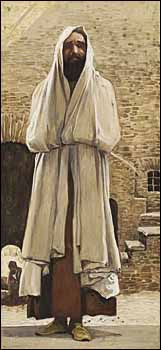 James J. Tissot, 'Malachi' (1898-1902), gouache on board, The Jewish Museum, New York. |
As we conclude our study of Elijah, it's important to consider what was his legacy, his lasting impact on Israel. We'll begin by pondering the passages concerning him in the Old and New Testaments, outside of 1 and 2 Kings.
Elijah Will Turn the Hearts (Malachi 4:5-6; Luke 1:17)
The first passage that treats Elijah's legacy comes from the lips of Yahweh's prophet Malachi, who prophesied after the return from the Exile, either prior to Ezra (500 to 475 BC), or perhaps in the time of Ezra and Nehemiah (450 to 430 BC).
The Book of Malachi -- and the Old Testament -- conclude with a warning of judgment, but also a promise of hope.
"See, I will send you the prophet Elijah before that great and dreadful day of the LORD comes." (Malachi 4:5)
Judgment will not occur until the people hear a prophet calling them back to God.269
Malachi gives a particular flavor to the ministry of this Elijah to come:
"He will turn270
the hearts of the fathers to their children,
and the hearts of the children to their fathers;
or else I will come and strike the land with a curse." (Malachi 4:6)
What does this mean? Is he referring to a healing of the generation gap, or to something more? I believe Malachi is declaring a return to the true faith of our spiritual fathers. As Keil writes,
"The fathers are ... the ancestors of the Israelitish nation, the patriarchs, and generally the pious forefathers, such as David and the godly men of his time. The sons or children are the degenerate descendants of Malachi's own time and the succeeding ages. The hearts of the godly fathers and the ungodly sons are estranged from one another.... Turning the heart of the fathers to the sons does not mean merely directing the love of the fathers to the sons once more, but also restoring the heart of the fathers in the sons, or giving to the sons the fathers' disposition and affections."271
Let me spell it out:
- Fathers = pious patriarchs and ancestors who followed Yahweh,
- Children = descendants of Israel who have fallen away from Yahweh,
- Turning the hearts = restoring the fathers' hearts in their descendants.
Elijah's great burden was to take an apostate nation, divided in its loyalties between Baal and Yahweh, and turn their hearts to the God of their fathers. He did this through a three-year drought, a contest on Mount Carmel, and by amazing victories in lopsided battles between a small Israelite army and overwhelming Syrian armies. Again and again, the people saw the hand of Yahweh at work, and many changed their allegiance from Baal to Yahweh. This turning, this repentance, Malachi tells us, will happen once again when Elijah is sent once more.
By the time of the New Testament, Elijah's return was greatly anticipated. Popular speculation had suggested that both John the Baptist and Jesus himself might be this Elijah.272 Certainly the story of Elijah was well-known and on people's minds.
Jesus angered those at Nazareth when he gave an example of Elijah's aid to a foreigner -- the widow of Zarephath -- rather than to an Israelite (Luke 4:26). Paul recalled Elijah's appeal to God that he was the only one left, though at that time God had a reserved remnant of 7,000 who were still faithful to Yahweh (Romans 11:1-6). At Jesus' crucifixion, when he called out the first words of Psalm 22, "Eloi, Eloi, lama sabachthani?" ("My God, my God, why have you forsaken me?"), bystanders thought he was calling Elijah the Prophet to save him, though others mocked this idea (Matthew 27:45-50).
Elijah Held in Highest Esteem in the New Testament
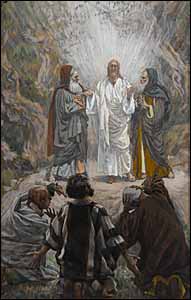 James J. Tissot, 'The Transfiguration' (1886-94), gouache on gray wove paper, 9.5 x 6.1 in., Brooklyn Museum, New York. |
At the transfiguration, Jesus appears with Elijah and Moses.
"His face shone like the sun, and his clothes became as white as the light. Just then there appeared before them Moses and Elijah, talking with Jesus." (Matthew 17:2b)
You might expect Moses to be talking with Jesus. After all, he was Israel's great leader during the Exodus. But in addition to Moses, I can think of a number of pivotal figures in Israel's history -- Samuel, David, and Joshua come to mind immediately. Why Elijah?
Of course, we are speculating now. No one knows this side of heaven. One theory that goes back to Origen (185-253 AD) is that Moses represents the Law while Elijah represents the Prophets, emphasizing that Jesus fulfilled the Law and sums up all the promises in the Prophets (Matthew 7:12; 22:40).
Then again, on this occasion Jesus spoke of his "departure" (Greek exodus, Luke 9:31). Moses, of course, led the people through the Red Sea in the Exodus from Egypt. Elijah exited earth in a spectacular manner -- in a whirlwind escorted by fiery horses and chariots. And both Moses and Elijah met Yahweh on a mountain -- Mt. Sinai -- and saw his Shekinah glory.273 Exactly why Elijah was present, we don't know. What we do know is that he was a great man of God.
Elijah as the Precursor to John the John the Baptist
In the Gospels, however, Elijah is front and center as the precursor of John the Baptist, in fulfillment of the prophecy found in the last two verses of the Old Testament (Malachi 4:5-6).
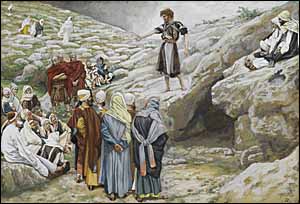 James J. Tissot, 'Saint John the Baptist and the Pharisees' (1886-94), gouache on gray wove paper, 6.19 x 9.06 in., Brooklyn Museum, New York |
Elijah's burden and legacy was to turn a nation's heart back to God. This was John the Baptist's burden also. "The Jews of Jerusalem sent priests and Levites to ask him who he was" (John 1:19) -- how they should understand him in terms of Bible prophecy. They raised three possibilities, each of which he rejected.
- The Christ (Messiah) -- that is, the anointed descendant of David who would deliver Israel from her enemies (2 Samuel 7:11-16). There was a high fervor of messianic expectation during this era.
- The Prophet -- that is, the prophet that Moses said would come after him (Deuteronomy 18:15-18).
- Elijah, whose coming in the end times as prophesied by Malachi at the end of the Old Testament (Malachi 4:5-6).
To each of these John answered, "No."
Rather, John the Baptist saw himself fulfilling another prophecy, one they hadn't mentioned.
"I am the voice of one calling in the desert, 'Make straight the way for the Lord.'" (John 1:23)
No doubt God has spoken ever-so-vividly to John that he was to fulfill Isaiah's vision of a wilderness messenger who did the work of preparation (John 1:19-23). All four Gospels point to this same passage.
" 3 A voice of one calling:
"In the desert274
prepare the way for the Lord;
make straight in the wilderness a highway for our God.
4 Every valley shall be raised up, every mountain and hill made low;
the rough ground shall become level, the rugged places a plain." (Isaiah
40:3--4)
The image is of a voice demanding that people prepare a royal highway in the wilderness for the coming king. This would require:
- Straight road, not twisting to accommodate obstacles.
- Level road, where mountains were carved down to fill up valleys, so the resulting roadway would be level, easy to travel, worthy of the king.
- Smooth road, where rough and rugged ground would be flat, level, and even. Any rocks in the roadbed would be shoved aside or ground to dust.
John the Baptist understood that the spiritual road-work of this "highway for our God" needed to be performed in the hearts of men and women who had fallen away from the Lord.
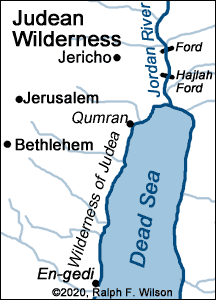 The Judean Wilderness (larger map) |
And so he began to preach in the "wilderness"275 along the Jordan near Jericho, to the east of Jerusalem. The land there isn't really arid -- it is 850 feet (260 meters) below sea level along a broad river valley. But the Jordan Valley east of Jericho is desolate, uninhabited, consisting of little but thickets of brush, with trees at the river's edge. A couple of fords across the Jordan would see regular travelers, but inhabited towns such as Jericho are several miles from the river bed itself.
As the angel spoke to Zechariah in the temple regarding the ministry of his son-to-be-born, he described the boy's ministry as both (1) turning of hearts (that is, prompting repentance) and (2) preparing hearts to receive the Messiah who was to come.
"And he will turn many of the children
of Israel to the Lord their God,
and he will go before him in the spirit and power of Elijah,
to turn the hearts of the fathers to the children,
and the disobedient to the wisdom of the just,
to make ready for the Lord a people prepared." (Luke
1:16-17, ESV)
"Bring back" (NIV in vs. 16), "turn" (NRSV, ESV, KJV, and NIV in verse 17) is epistrephō, "to turn to," here, "to cause a person to change belief or course of conduct, with focus on the thing to which one turns, turn," in a spiritual or moral sense.276 Turning hearts is another way of saying "calling to repentance." Indeed, John was known for demanding that people repent, be baptized, and be cleansed from their sins.
Isaiah's prophecy was about preparing a people. The angel spoke of John's task with two words:
- "Make ready" -- "to cause to be ready, put/keep in readiness, prepare."277
- "Prepared" -- "to make ready for some purpose, make ready, prepare."278
Elijah's mission to turn a generation of people back to God was very similar to John the Baptist's. Yet, John's mission had an increased urgency, because within a few months of beginning his ministry, Jesus the Lamb of God would appear on the scene.
Was John the Baptist Elijah?
Some in our day might think of John the Baptist in terms of Elijah "reincarnated." Reincarnation has come into American vocabulary through a renewed interest in Eastern religions. But the idea of a soul being endlessly reborn in new life forms until his karma is good enough to achieve Nirvana was foreign to Judaism. However, the idea of resurrection was present, especially among the Pharisees. Inquiring about Jesus, Herod the tetrarch wonders that Jesus might be John or one of the prophets "raised from the dead" or "come back to life" (Luke 9:7--8).
Nevertheless, we ask: Is John the Baptist actually the prophet Elijah who has to come to prepare the people?
1. Clothing. He dresses like Elijah. Of Elijah, it was said,
"He was a man with a garment of hair and
with a leather belt around his waist" (2 Kings 1:8a).
Matthew declares:
"John's clothes were made of camel's hair,
and he had a leather belt around his waist.
His food was locusts and wild honey." (Matthew 3:4)
2. Boldness. Like Elijah, John boldly rebukes the sins of the powerful (Luke 3:7-14; Mark 6:18). John the Baptist comes "in the power and energy with which Elijah rose up to lead back the ungodly generation of his own time to the God of the fathers."279
3. Repentance. Like Elijah, John preaches a gospel of repentance.
The problem is that John denies being Elijah (John 1:21). Could he be Elijah and not know it? I think the answer can be found in the angel's prophecy to Zechariah before John's birth:
"He will go on before the Lord, in the spirit and power of Elijah.... (Luke 1:17a)
John isn't Elijah, but he comes with Elijah's mission and boldness, using "spirit" in the sense of "spiritual state, state of mind, disposition."280 Jesus suggests the tension between the historical Elijah and John the Baptist's manifestation of his ministry in his explanation to the disciples:
"If you are willing to accept it, he is the Elijah who was to come." (Matthew 11:14)
"10 The disciples asked him, 'Why
then do the teachers of the law say that Elijah must come first?'
11
Jesus replied, 'To be sure, Elijah comes and will restore all
things. 12 But I tell you, Elijah has already come, and they
did not recognize him, but have done to him everything they wished. In the same
way the Son of Man is going to suffer at their hands.' 13 Then the
disciples understood that he was talking to them about John the Baptist."
(Matthew 17:10--13)
Q29. (Malachi 4:5-6; Luke 1:17) In what ways did
Elijah's ministry and calling have similarities with John the Baptist's
ministry and calling? Was John the Baptist actually Elijah reincarnated?
https://www.joyfulheart.com/forums/topic/2133-q29-john-the-baptist/
Elijah, a Man Just Like Us (James 5:16-18)
James closes his letter with a call to pray using Elijah as the prime example.
"16 Therefore confess your sins to each other and pray for each other so that you may be healed. The prayer of a righteous man is powerful and effective.
17 Elijah was a man just like us. He prayed earnestly that it would not rain, and it did not rain on the land for three and a half years. 18 Again he prayed, and the heavens gave rain, and the earth produced its crops." (James 5:16--18)
I am particularly struck with James' declaration, "Elijah was a man just like us." James has just encouraged all Christian believers to be involved in this ministry of confession and prayer for healing -- both spiritual and physical. It is as if James can feel your reticence, as if you were saying, "I'm not spiritual enough to do that. My prayers aren't anything special." So James draws your attention to the prophet Elijah who spoke a word that caused a three-and-a-half-year drought, and spoke another word that ended it.
Wow! Powerful! I could never do that. He must be a great man of God.
Elijah is a great man of God. He does courageous and powerful exploits for God. But at other times he is weak and paranoid and fearful and self-important. After he has slain the 450 prophets of Baal on Mount Carmel (1 Kings 18), he flees Jezebel's wrath. He runs for his life into the desert and lies down under a broom tree, physically, emotionally, and spiritually spent. "I have had enough, Lord," he says, "Take my life. I am no better than my ancestors" (1 Kings 19).
It gets worse.
He runs some more until he comes to Mount Sinai (Horeb). When he gets there, God asks him, "What are you doing here, Elijah?" Elijah answers with whining and excuses, the kind you wouldn't accept from your own children (1 Kings 19:10).
God just listens, and then speaks to Elijah in a still small voice, gives him three tasks to do, and says, "By the way, Elijah. There are still 7,000 who haven't worshipped Baal. You're not the only one, after all."
Elijah the great man of God isn't such a great man after all. So why does James mention him? Because we can identify with Elijah's weaknesses!
Elijah is an example to us that God can call ordinary men and women -- with all the weaknesses and failures that we experience -- to do great things for him. Extraordinary things! Elijah is weak. He is sometimes afraid. But he is righteous, that is, right with God, according to verse 16.
"The prayer of a righteous man is powerful and
effective." (NIV, cf. NRSV)
"The effectual fervent prayer of a righteous man availeth much."
(KJV)
"The prayer of a righteous person has great power as it is working." (ESV)
Note that the noun "man" that occurs in some translations isn't in the Greek text. This text applies to both men and women. The text seems to say that the righteous person who will put prayer into action281 -- actually pray -- is able to see powerful results.282 We should not wait until we become some great man or woman. Elijah was an ordinary human being. Rather, we should pray -- believing God -- and let God take it from there. Prayer lets loose the power of God. Pray!
Q30. (James 5:16-18) Elijah is James' example of an
ordinary man who did extraordinary things through believing prayer. Do you
believe God can use you in extraordinary ways? Why? or Why not? What keeps us
from being used effectively?
https://www.joyfulheart.com/forums/topic/2134-q30-faith/
7.4 Assessing Elijah's Life and Ministry
As I look over Elijah's life, I see a common man called to a monumental task. I see him on Mount Carmel. The prophets of Baal have spent themselves in praying, wailing, and dancing before their lifeless god.
Now Elijah patiently goes to the place where the altar of God once stood. He finds the ancient stones lying scattered about the site -- twelve of them. Now he dry-fits them together to construct an altar where Yahweh can once again be honored and worshipped. He rebuilds the altar of the Lord.
His whole ministry in the midst of an apostate people is to accomplish this one thing: to show them that Yahweh is alive. That he loves them in spite of their sins. Elijah lives so God's people will turn away from the worthless imitation god and say once again, "Yahweh, he is God! Yahweh, he is God!" (1 Kings 18:39).
Elijah lives to demonstrate to Yahweh's beloved people that their God has power to defeat their enemies and heal their hurts.
"Do you see this vast army?" Elijah says on behalf of his God to a backslidden king. "I will give it into your hand today, and then you will know that I am Yahweh" (1 Kings 20:13). He longs for his people to turn back to God!
His legacy, his heart, is to rebuild the altar of Yahweh, to cause God's people to know him once again and worship him as God.
Did Elijah Succeed?
Did Elijah succeed in this task? Only partly, though Jehu, who Elijah was directed to anoint, succeeded in wiping out the cult of Baal worship in Israel (2 Kings 10:28). Elijah, like David, "served God's purpose in his own generation" (Acts 13:36).
Did John the Baptist succeed? Only partly. Thousands come to the Lord, but John is arrested and from prison wonders, "Are you the One or are we to look for another?" (Matthew 11:3).
I see Jesus on Palm Sunday riding a donkey from Bethphage into Jerusalem the week before his death.
"As he approached Jerusalem and saw the city, he wept over it and said, 'If you, even you, had only known on this day what would bring you peace -- but now it is hidden from your eyes...." (Luke 19:41-42)
Jesus foresees the destruction that will come, and his heart breaks for his blind and suffering people. Jesus has preached to thousands. Has he succeeded? Only partly. At least, that is how it seemed at the time.
Ministry is like that. We do our part, yet there is more to be done. We help some people see the Lord, but so many others remain blind to his glory.
Determining Success
So how do we determine the success of our ministry? Of Elijah's ministry?
Elijah lived his whole life preaching to an unfaithful people. He saw breakthroughs and he saw defeats, people coming to the light as well as light-hardened blindness. Yet he remained faithful. Success is not measured in numbers of converts. It is not determined by the extent to which our message is accepted. Paul reminds us:
"I do not even judge myself.... Judge nothing before the appointed time; wait till the Lord comes." (1 Corinthians 4:3b, 5a)
The real success, the only lasting success, was accomplished at greatest cost by our Lord Jesus, who bore the sins of every last person on the planet on his body on the tree.283 In doing so, he opened the door of heaven to all mankind. All of our ministries pale by comparison. What a privilege you and I -- and our brother Elijah -- have had to be co-workers with a God of such great love and mercy.
And on the day of Christ's return, the true fruit of Elijah's ministry will be known -- and John the Baptist's, and yours and mine. In the meantime, be faithful, be faithful, until the Lord calls you to glory.
Q31. What was Elijah's primary mission? How successful
was he at this mission? How can we measure success in ministry? What are the
dangers of self-assessment? When can an accurate assessment be made?
https://www.joyfulheart.com/forums/topic/2135-q31-success/
Lessons for Disciples
There is much we can learn from this final chapter of Elijah's life, and references to him in the Old and New Testaments.
- Like Elijah's confusing words to Elisha, we'll experience many temptations to stop following our Lord and Master, but we must firmly resist them as Elisha did: "I will not leave you" (2 Kings 2:2-6). We are called to faithfulness.
- We may know secret things from God (like the prophets knew the Lord was going to take Elijah that day), but some of what the Lord shows us is for us only, not to be shared (2 Kings 2:-3-5; Matthew 17:9).
- In parting the Jordan with his mantle, Elijah is to be seen as a successor to Moses, who parted the Dead Sea by God's power (2 Kings 2:7-8).
- Elisha asks for a double portion (or a full first-born's inheritance) of Elijah's spirit. Such a longing for a greater power and presence of the Holy Spirit should be in us constantly! (2 Kings 2:9-11).
- God honors Elijah with the rare gift of taking him directly to heaven without first seeing death (2 Kings 2:11-12). If we're alive at the coming of Christ, we'll experience that too! (1 Thessalonians 4:13-18) .
- The prophecies Elijah speaks against Ahab and Jezebel and Ahab's descendants come to pass just as Elijah said -- with terrible precision. True prophecy comes to pass!
- Malachi prophesies that Elijah will return before the final judgment to turn his people back to the faith of their fathers the patriarchs. This is fulfilled in the ministry of John the Baptist, especially in his boldness and ministry of calling for repentance (Malachi 4:5-6; Luke 1:17).
- Elijah is used as an example of an ordinary man who seeks to live a righteous life before God and sees great things happen through prayer (James 5:16-18). God can use ordinary people like us in powerful ways if we will just pray believing!
- It is impossible to determine the true success of Elijah's ministry -- or our own ministries -- prior to Christ's Second Coming (1 Corinthians 4:3-5). We, like Elijah, are called to obedience and faithfulness to be instruments in God's hands that he can use to work out his will for our generation.
 Available in paperback, PDF, and Kindle formats. |
Prayer
Lord, we sometimes feel like complete failures, judging ourselves in ways you never intended. Help us, like Elijah, to be faithful to you and leave the results to you. We look forward to that day when we will feast around your table in the Kingdom of God along with our brother Elijah. Come soon, Lord Jesus! In your holy name, we pray. Amen.
Key Verses
"Then Elijah said to him, 'Stay here, Elisha; the Lord has sent me to Jericho.' And he replied, 'As surely as the Lord lives and as you live, I will not leave you.'" (2 Kings 2:4, NIV)
"Elijah said to Elisha, 'Tell me, what can I do for you before I am taken from you?' 'Let me inherit a double portion of your spirit,' Elisha replied." (2 Kings 2:9, NIV)
"Suddenly a chariot of fire and horses of fire appeared and separated the two of them, and Elijah went up to heaven in a whirlwind. Elisha saw this and cried out, 'My father! My father! The chariots and horsemen of Israel!' And Elisha saw him no more." (2 Kings 2:11--12, NIV)
"See, I will send you the prophet Elijah before that great and dreadful day of the Lord comes. He will turn the hearts of the fathers to their children, and the hearts of the children to their fathers; or else I will come and strike the land with a curse." (Malachi 4:5--6, NIV)
"Many of the people of Israel will he bring back to the Lord their God. And he will go on before the Lord, in the spirit and power of Elijah, to turn the hearts of the fathers to their children and the disobedient to the wisdom of the righteous -- to make ready a people prepared for the Lord." (Luke 1:16--17, NIV)
Endnotes
[221] "About to take up" (NIV, ESV, NRSV), "would take up" (KJV) is the Hiphil infinitive construct of the very common verb ʿālâ, "go up, come up, ascend", here in the Hiphil causative sense, "make high, bring (high) up, make something go up" (Holladay 273, H3; TWOT #1624).
[222] "Whirlwind" in verses 1 and 11 is sĕʿārâ, "windstorm." "Gale, heavy windstorm" (Holladay 258). The word is used in a theophany in Job 38:1; 40:6.
[223] As yet, archaeologists have found no evidence of the city; there are no archeological remains there earlier than the Byzantine era (W. H. Brownlee, "Gilgal," ISBE 2:470-472).
[224] 1 Samuel 7:16.
[225] Hosea 4:15; 9:15; 12:11; Amos 4:4; 5:4-5.
[226] "Stay here" (NIV, NRSV, ESV), "tarry here" (KJV) in verse 2, 4, and 6 is the Qal imperative of yāšab, "sit, remain, dwell" (TWOT #921).
[227] "Please" (ESV), "I pray thee" (KJV), omitted (NIV, NRSV) in verses 2, 4, and 6 is the interjection nāʾ, a particle of entreaty or exhortation (TWOT #1269). Holladay calls it an "enclitic particle of urgency," translation difficult to specify, e.g. "please" (come in), "do" (come in); "just" (listen to me) (Holladay 223). We also saw this in 1 Kings 17:11.
[228] "Surely" (NIV), omitted (ESV, NRSV, KJV) is the conjunction ʾim, used in oath contexts.... From this fuller form of the oath, we see the practice frequently of abbreviating the oath, omitting "the Lord do so to me and more also" (Jack B. Scott, TWOT #111). "In oaths, as a conditional (self-) imprecation: b) apodosis suppressed (so usually), so that ʾim lōʾ = 'surely,' Isaiah 5:9" (Holladay 19, 4b).
[229] "Leave" in verses 2, 4, and 6 is the Qal imperfect of ʿāzab, "leave, forsake, loose, abandon" (TWOT #1594; Holladay 269, 1).
[230] They seem to have been traveling in the mountains, for to go "down" to Bethel would suggest a higher elevation. "Up" and "down" as north and south didn't come until maps were used. "Go down" is the Qal imperfect of yārad, "go down, descend" (John E. Hartley, TWOT #909). Wiseman notes that the term "go down" causes some to find the site for Gilgal at Jiljûlieh, about 8 miles (13 km) north of Bethel (Wiseman, 1&2 Kings, p. 195; W.H. Brownlee, "Gilgal," ISBE 2:471, 2)
[231] It is usually identified with the modern village of Beitin (W. Ewing and R.K. Harrison, "Bethel," ISBE 1:465).
[232] Genesis 28:11-21; 31:13.
[233] 1 Samuel 7:16.
[234] The phrase is kehayyôm, "just now." Holladay cites 1 Samuel 9:13 (Holladay 131, 9c). From Bethel to Jericho is a pretty steep downhill road dropping about 3,670 feet (1,119 meters) in elevation. The distance from Bethel to Jericho by road is about 29 miles (47 km.), and would take at least a day on foot. So the "today" in verse 3 may be meant more generally, perhaps "imminently" rather than "within precisely 24 literal hours." The phrase "from over you" (NIV), "from over you" (ESV), is literally "from thy head" (KJV).
[235] "Take" (NIV, NRSV), "take away" (ESV, KJV) in verse 3, 5, 7, and 9 is the Qal participle of lāqaḥ, "take," here, "take away," where (God) carries off someone, Enoch Genesis 5:24 (Holladay, 178, 9).
[236] "From you" (NIV, NRSV), "from over you" (ESV), literally "from thy head" (KJV) using rōʾš, "head" could be here, "head, chief leader" (Holladay 329, 6). Maʿlâ, as a preposition, "above" (him) (Holladay 206, 1b).
[237] "Do not speak of it" (NIV), "keep quiet/silent" (ESV, NRSV), "hold ye your peace" (KJV) is the Hiphil imperative of ḥāšâ, "be silent" (Holladay 119, 2).
[238] "Mantle" (KJV, NRSV), "cloak" (ESV, NIV) at 1 Kings 19:19; 2 Kings 2:8, 13, 14, is the noun ʾadderet, "mantle, cloak, majesty" from ʾādar, "to be majestic." Coppes notes, "The noun "mantle" is at first surprising, but it refers to a costly robe (Joshua 7:21) or prophets' mantle, etc. (2 Kings 2:8)" (Leonard J. Coppes, TWOT #28c). Jonah 3:6 could be translated "robe of state" (Holladay 5, 2a).
[239] "Struck" (NIV, ESV, NRSV), "smote" (KJV) is the Hiphil imperfect of nākâ, "strike, hit, beat" (Holladay 237; TWOT #1364).
[240] "Rolled it up" (NIV, ESV, NRSV), "wrapped it together" (KJV) is the Qal imperfect of gālam, "wrap up, fold, fold together," only used in the OT in this verse (TWOT #354), "roll up" (mantle) (Holladay 61).
[241] Exodus 14:22; Joshua 3:17.
[242] "What can I do for you?" (NIV), "What shall I do for you?" (ESV, KJV), "what may I do for you?" is Qal imperfect of the very common verb ʿāśâ, "do, fashion, accomplish" (TWOT #1708; Holladay 284).
[243] "Taken" (NIV, ESV, NRSV), "taken away" (KJV) is Niphal imperfect of lāqaḥ (that we saw above in verse 3, 5, and 7 as a Qal participle), "be taken away" (Holladay 179, N1).
[244] "Inherit" (NIV, NRSV), literally, "be upon me" (ESV, KJV) is the Qal imperfect of hāyâ, "to be, become, exist, happen" (TWOT #491).
[245] "Portion" is peh, "mouth" is here used in fractional units: peh šĕnayim (Deuteronomy 21:17; 2 Kings 2:9; Zechariah 13:8). This particular phrase has been translated two ways--"a double portion" or "two-thirds," which is more correct. Hence, Elisha asks not for a "double portion" of Elijah's power and gift but for two-thirds." (Victor P. Hamilton, TWOT #1738, 6). "Two parts" (Holladay 289, 8). The Jewish inheritance laws had this provision to keep the family property from being split up between the sons. "The request for a double portion was not that he might excel his master, but that he should receive the eldest son's share according to the law (Deuteronomy 21:17). Such a son had the responsibility to carry on the father's name and work" (Wiseman, 1&2 Kings, p. 195).
[246] T. Lewis and R.K. Harrison, "First-born," ISBE 2:308.
[247] "Difficult" (NIV), "hard" (ESV, NRSV, KJV) is the Hiphil perfect of qāšâ, "be hard, severe" (TWOT #2085); "ask the thing difficult" (Holladay 326, H2).
[248] "See" is the Qal imperfect of very common rāʾâ, "see, look at, inspect" (TWOT #2095).
[249] G.H. Jones, 1&2 Kings, p. 385. "What Elijah implies is that Elisha's status as a successor depends on his ability to see and comprehend the spiritual world. If he possesses the ability of a visionary to penetrate into the heavenly world, his request will be granted; if he cannot demonstrate that he has that ability, his request will not be granted."
[250] In both verse 11 and 12, "chariot" is singular, and horses or horsemen are plural in the Hebrew text.
[251] "Separated" (ESV, NRSV), "appeared and separated" (NIV), "appeared ... and parted them both asunder" (KJV) is just one verb, the Hiphil imperfect of pārad, "divide, separate" (TWOT #1806; Holladay 297, H2). The word "appeared" in the NIV and KJV is not in the Hebrew text.
[252] "Went up" (ESV, KJV, NIV), "ascended" (NRSV) is the Qal imperfect of ʿālâ, "go up, climb, ascend" (Holladay 273, 1; TWOT #1624).
[253] "Horsemen" is pārāš, "horse, horsemen, rider." The various lexica differ radically among themselves as to how often and where pārāš ="horse" and where "rider." Some have suggested that the proper translation of pārāš is always "horse" and if "horsemen" is ever allowable. The reference is to those who were charged with managing the horses (as in a chariot), not to those who mount for riding (Mowinckel) (TWOT #1836a), but see Holladay 299.
[254] Jehoash, king of Israel, evil as he was, seems to use the phrase just before the prophet's death: "My father! My father!" he cried. 'The chariots and horsemen of Israel!'" (2 Kings 13:14). Is Jehoash calling out for Yahweh's protection against Syria? Wiseman (1&2 Kings, p. 241) suggests that they might be the words of the dying prophet [Elisha] anticipating death. Jones (1&2 Kings, p. 502) says: "The king uses the phrase to acknowledge the part played by Elisha in Israel's life during those troubled years." We're not sure.
[255] Sĕʿārâ, "windstorm" (TWOT #1528b). "Gale, heavy windstorm" (Holladay 258). The word is used in a theophany in Job 38:1; 40:6.
[256] See Wikipedia article, "Mediterranean tropical-like cyclone."
[257] "Behold" (ESV, KJV), "suddenly" (NIV), omitted (NRSV) is the Hebrew hinnēh, "behold, lo, see," an interjection demanding attention, occurring over one thousand times. Often used to point out things, more often to point out people (TWOT #510). Since "behold" isn't used much in contemporary English, it is often omitted in translations seeking to be more contemporary and less literal.
[258] "Chariot" (NIV, NRSV, KJV), "chariots" (ESV) in verse 11 and 12 is the singular noun (rekeb, "chariot, chariotry," the common term for a horse drawn vehicle used for warfare and royal travel. It appears over 120 times in the Old Testament. The chariot, rekeb, is used as a symbol of God's majesty and judgment (Psalm 68:17) (William White, TWOT #2163a).
[259] Wiseman, 1&2 Kings, pp. 195-196.
[260] "Took away" (NIV), "took" (ESV, NRSV, KJV) is the Qal perfect of lāqaḥ, "take, lay hold of" (TWOT #1124). This is the same verb used to describe Elijah's being taken up in 2 Kings 2:3, 5, 7, and 9.
[261] "Tore in two pieces" (ESV, NRSV), "rent in two pieces" (KJV), "tore them apart" (NIV) is šĕnayim, "two"; and the Qal imperfect of qāraʿ, "tear, tear in pieces," rending cloth or a similar substance (TWOT #2074).
[262] "Fallen" is the Qal perfect of nāpal, "fall (unintentionally)" (Holladay 241, 1).
[263] "Is resting" (NIV), "rests" (ESV, NRSV), "doth rest" (KJV) is the Qal perfect of nûaḥ, "rest, settle down," "settle" (intransitive), the spirit of Elijah on Elisha. The root "signifies not only absence of movement but being settled in a particular place (whether concrete or abstract) with overtones of finality" (Leonard J. Coppes, TWOT #1323).
[264] Kings 10:32-33; 13:1-9; Amos 1:13.
[265] 2 Kings 12:17-18; 2 Chronicles 24:23-24.
[266] This Hazael as king of Syria appears in the annals of Shalmaneser III, king of Assyria (859-824 BC) (R.K. Harrison, "Hazael," ISBE 2:635.
[267] 1 Kings 22:51-2 Kings 1:18.
[268] 1 Kings 21:20-29; 2 Kings 9:22-26.
[269] Based on this prophecy, the apocryphal book of the Wisdom of Sirach (200-175 BC) notes that Elijah will "allay God's wrath before the fury breaks" (Sirach 48:10).
[270] "Turn" is the extremely common verb shûb, "turn, return," that we've encountered before. Sometimes it's used in the sense of repentance, but usually it lacks a theological connotation.
[271] Carl Friedreich Keil, "Commentary on Malachi," in Carl Friedreich Keil and Franz Delitzsch, Commentary on the Old Testament (German 1866-82; T & T Clark, 1872-77), in loc.
[272] John 1:21; Matthew 16:14; Mark 6:15.
[273] It is popular in some circles to teach that the two Last Day prophets of Revelation are Moses and Elijah (Revelation 11:1-2), but there is no Biblical evidence for this.
[274] "Desert" (NIV) is midbār, "wilderness, desert. Midbār is used to describe three types of country in general: pastureland, uninhabited land, and large areas of land in which oases or cities and towns exist here and there. The wilderness of Jordan (the alluvial plain) contains cities (Earl S. Kalland, TWOT #399l).
[275] The Greek erēmos is an adjective that refers to "being in a state of isolation." As a noun, the word refers to "an uninhabited region or locality, desert, grassland, wilderness (in contrast to cultivated and inhabited country)" (BDAG 392, 2).
[276] Epistrephō ,BDAG 382, 3.
[277] Hetoimazō, BDAG 400, b.
[278] Kataskeuazō, BDAG 526, 1.
[279] C. F. Keil, "Malachi," Commentary on the Old Testament, op. cit., in loc.
[280] Pneuma, BDAG 833, 3c. However, Danker lists our verse as: "The Spirit of God as exhibited in the character or activity of God's people or selected agents, 'Spirit, spirit'" (BDAG 833, 6a).
[281] "Effective" (NIV, NRSV), "effectual" (KJV), "as it is working" (ESV) modifies prayer is the present middle participle of energeō, "to put one's capabilities into operation, to be active, operate, be effective" (BDAG 335, 1b).
[282] "Powerful" (NIV, NRSV), "power" (ESV), "availeth" (KJV), "can accomplish" (NASB) as the present active indicative of ischuō, "to have requisite personal resources to accomplish something, have power, be competent, be able" (BDAG 484, 2a).
[283] 1 Peter 2:24; 1 John 2:2; 1 Timothy 4:10; Romans 5:18.
Copyright © 2025, Ralph F. Wilson. <pastor![]() joyfulheart.com> All rights reserved. A single copy of this article is free. Do not put this on a website. See legal, copyright, and reprint information.
joyfulheart.com> All rights reserved. A single copy of this article is free. Do not put this on a website. See legal, copyright, and reprint information.
 |

|
In-depth Bible study books
You can purchase one of Dr. Wilson's complete Bible studies in PDF, Kindle, or paperback format -- currently 48 books in the JesusWalk Bible Study Series.
Old Testament
- Abraham, Faith of
- Jacob, Life of
- Moses the Reluctant Leader
- Joshua
- Gideon
- David, Life of
- Elijah
- Psalms
- Solomon
- Songs of Ascent (Psalms 120-134)
- Isaiah
- 28 Advent Scriptures (Messianic)
- Daniel
- Rebuild & Renew: Post-Exilic Books
Gospels
- Christmas Incarnation (Mt, Lk)
- Sermon on the Mount (Mt 5-7)
- Luke's Gospel
- John's Gospel
- Seven Last Words of Christ
- Parables
- Jesus and the Kingdom of God
- Resurrection and Easter Faith
- Apostle Peter
Acts
Pauline Epistles
- Romans 5-8 (Christ-Powered Life)
- 1 Corinthians
- 2 Corinthians
- Galatians
- Ephesians
- Philippians
- Colossians, Philemon
- 1 & 2 Thessalonians
- 1 &2 Timothy, Titus
General Epistles
Revelation
Topical

 To be notified about future articles, stories, and Bible studies, why don't you subscribe to our free newsletter, The Joyful Heart, by placing your e-mail address in the box below. We respect your
To be notified about future articles, stories, and Bible studies, why don't you subscribe to our free newsletter, The Joyful Heart, by placing your e-mail address in the box below. We respect your